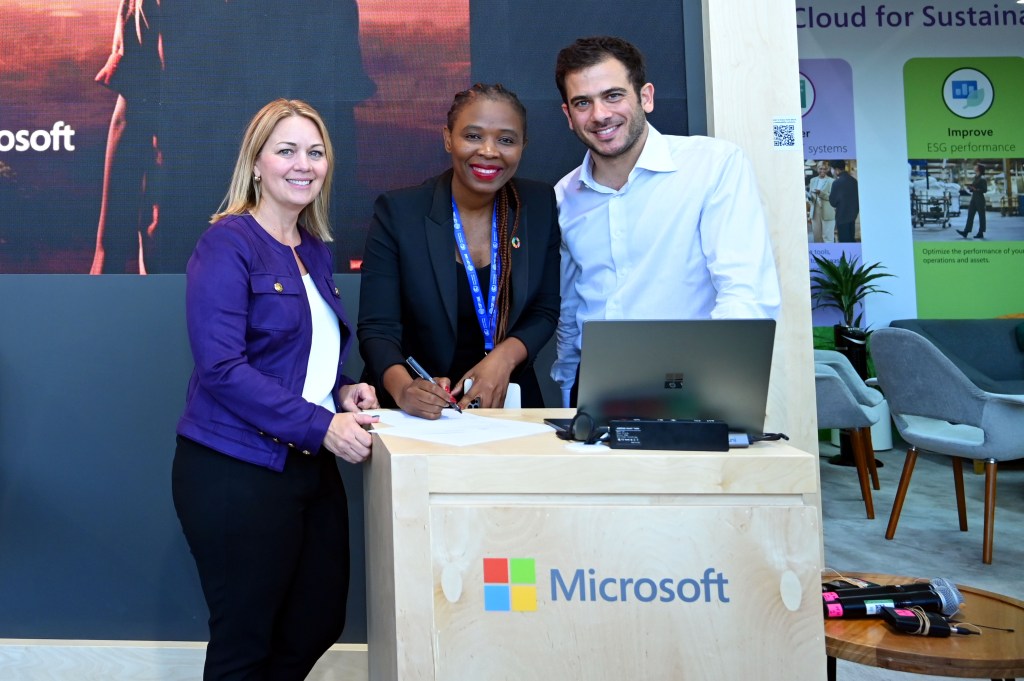
- Home
- About Us
- Sustainability
- Investors
- News
- People & Culture
-
Regions

The collaboration aims to harness satellite monitoring, AI, mobile connectivity, and cloud computing to provide critical early warning information to millions across the continent.
On the sidelines of COP 28, weather intelligence and climate adaptation leader Tomorrow.io, and MTN Group, Africa’s largest mobile operator, leveraging a Microsoft Azure technology grant from Microsoft’s AI for Good Lab, have joined forces to unveil a pioneering initiative designed to facilitate an infrastructure to provide life-saving early warnings and critical weather information to at-risk populations of more than 300 million people across Africa.
Through this partnership, MTN’s vast customer base will be able to receive early warning notifications about severe weather events, generated through Tomorrow.io’s weather intelligence and Microsoft Azure, via MTN’s broad set of mobile services facilitating timely evacuations and preparedness actions.
At the core of the initiative is the integration between Tomorrow.io’s hyperlocal bespoke weather engine – which include cutting-edge satellite data, generative-AI, and deep learning modeling capabilities – Microsoft’s Azure cloud computing platform, and MTN’s mobile network services, enabling the infrastructure for seamless dissemination of localised, impact-based weather information to communities with limited accessibility across the continent. By establishing the service, the partnership will seek to collaborate with local meteorological departments in participating countries to enable users with access to additional critical weather information.
“This collaboration with MTN Group and Microsoft is a significant stride towards harnessing the power of mobile connectivity and cloud computing to help democratise access to early warning information to all at risk,” said Rei Goffer, Co-founder and Chief Strategy Officer at Tomorrow.io. “By providing actionable weather intelligence, we are empowering communities to make informed decisions and thrive amidst an increasingly unpredictable climate.”
“Data and AI have the potential to unlock life-changing weather information for people around the world,” said Juan Lavista Ferres, Vice President and Chief Data Scientist, Microsoft “and this work will help to get that information in the hands of those most impacted and allow them the opportunity to take action in advance of extreme weather events as a result of the changing climate.”
While the partnership will initially launch in Western Africa, the plans for growth include all African countries where MTN operates.
Signing the agreement on the sidelines of COP28, MTN Group Chief Sustainability & Corporate Affairs Officer, Nompilo Morafo remarked: “Our partnership with Tomorrow io. and Microsoft is a significant step in the realisation of UN’s drive to ensure early warning systems for all by the end of 2027.”
“With human-induced climate change leading to more extreme weather conditions, the need for early warning systems is more crucial than ever. Early warning systems like this can play a meaningful role in decreasing the number of deaths and reducing the losses and damages resulting from hazardous weather, water or climate events in Africa,” she said.
“As a pan-African mobile operator, a technological solution that reduces risk and co-creates value with our partners for our customers was a deliberate decision. The dissemination of life-saving information should be a benefit of a modern connected life,” said Chika Ekeji, MTN Group Chief Strategy and Transformation Officer. “This initiative underscores MTN’s commitment to leveraging technology in addressing the most pressing climate challenges facing our communities.”
Over time, the collaboration will also introduce a range of subscription-based value-added services, tailored to support crucial sectors such as agriculture, and aligning with the broader United Nations’ focus on leveraging technology for sustainable development.